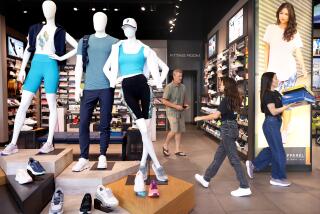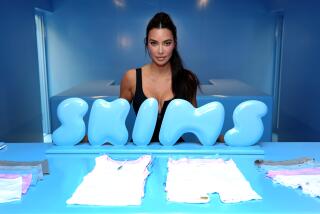Pacoima Shoe Manufacturer Grows by Leaps : K-Swiss Takes a Run at Reebok
K-Swiss isnât exactly L.A. Gear. Pacoima Gear, maybe.
From an industrial park on Montague Street on the east end of Pacoima, the sports shoe manufacturer is trying to emerge from a pack of perhaps two dozen also-rans in the sneaker business to challenge the industryâs elite giants--Reebok, Nike and L.A. Gear.
In recent years, success in sneakers has come through selling thousands of styles of brightly colored shoes promoted with big advertising budgets and endorsements from sports superstars. In addition, the companies with the biggest growth have successfully sold their shoes as the ones to wear for fashion or for one kind of exercise, such as jogging, aerobics or playground basketball.
For nearly 20 years, K-Swiss made only one kind of shoe. It was popular among tennis buffs, but was virtually unknown to most people. Thatâs the way its founders, Swiss-born brothers Arthur and Ernest Bruner, wanted it.
âThe company never changed and never varied. It opened at 8 in the morning and closed at 4:30 in the afternoon, no matter what,â said Preston Davis, K-Swissâ vice president of marketing.
Sales Double in Two Years
Two years ago, K-Swiss was bought for more than $20 million by a group--led by shoe industry veteran Steven Nichols--that was backed financially by John Hancock, the giant insurance company, and the Bank of New England.
At the time K-Swiss was sold, sales had leveled at $20 million a year. In the two years since Nichols took over, sales have more than doubled to $45 million. Instead of one basic shoe, it now has five styles that have about 150 variations, mostly in color.
The company is now the 16th largest in the nationâs $4.2-billion-a-year sports shoe business, according to the newsletter Sporting Goods Management News in Yardley, Pa. K-Swiss, for years a shoe that was primarily sold in the West, is now sold nationally in such chains as Foot Locker and the Athleteâs Foot.
âThey are really doing quite well and are perceived by many people as one of the real ones to watch in the industry,â said Dick Silverman, editor of Footwear News, the industryâs main trade publication.
Lately, K-Swiss has been getting the kind of sales push it has never received before. A $1-million advertising campaign, small by industry standards but big by K-Swiss standards historically, is under way, including full-page ads in such mass-circulation magazines as Sports Illustrated.
The company also is trying to attract attention through low-budget, and sometimes offbeat, celebrity endorsements.
Offbeat Endorsements
Signing up celebrity athletes is standard operating practice for the big sports shoe companies. But K-Swiss cannot afford the millions of dollars it would take to sign up athletes with the status of basketball superstars Magic Johnson of the Los Angeles Lakers, who runs up the court in Converse sneakers, and Michael Jordan of the Chicago Bulls, who works for Nike, or tennis wonder Steffi Graf, who wears Adidas shoes on her feet and the companyâs logo everywhere else.
K-Swiss has in its celebrity stable Los Angeles Lakers rookie David Rivers, who wears the companyâs shoes while averaging less than 10 minutes playing time a game as Johnsonâs backup at point guard. Another K-Swiss celebrity is Bud Collins, a bald, middle-aged Boston Globe tennis writer. Collins is also a television tennis commentator and was once voted the gameâs worst announcer in a poll of fans conducted by a tennis magazine.
Davis said most celebrity endorsements of shoes are ineffective. Most people, he argued, do not know what shoes the top athletes wear, except in the case of superstars like Jordan. As a result, he said, K-Swiss is trying to be different by using people like Collins.
âItâs a little bit of what we call guerrilla warfare. It makes you stop and think,â he said.
K-Swiss does things differently--for example giving its shoes, which retail for $30 to $75 a pair, names that come from places in Switzerland, even though the company now has as much in common with that nation as Pacoima does. A tennis shoe is the âGstaad.â One for basketball is the âBristen,â not the most intimidating, in-your-face name on the playground these days.
Although K-Swiss has grown rapidly in the past two years, being No. 16 in the sneaker business does not carry with it much cachet. In autos, there are the Big Three--General Motors, Ford and Chrysler. In sneakers, itâs the Big Two.
âItâs Nike, Reebok and the 20 dwarfs,â said John Horan, publisher of Sporting Goods Management News.
Last year, Reebokâs sales were $1.8 billion; Nikeâs were at $1.2 billion for the fiscal year ended last May 31. Reebokâs share of the U.S. athletic footwear market was 27%, with Nikeâs at 23%, according to Sporting Goods Management News. A long way back is the rest of the pack, led by Converse, with about 6% of the market, and L.A. Gear, with about 5%.
Keeping It Simple
A longer way back is K-Swiss. Even with its strong recent showing, it holds a mere 1.1% of the domestic sports shoe market, according to Sporting Goods Management News.
Still, the company hopes to join the ranks of the fast-growing challengers to Nike and Reebok, notably L.A. Gear and British Knights, a popular shoe among inner-city youths.
Nichols, who is K-Swissâ president, plans to get there by keeping it simple. No need to make thousands of styles and colors, which often leaves stores stuck with shoes they cannot sell. K-Swiss uses simple styles that are made using only three pieces of leather per shoe so there are fewer seams.
âWe come out with one model a season. We donât have to do it with fluff,â Nichols said.
Horan, the newsletter publisher, sees simplicity as one of K-Swissâ strengths. Consumers are being bombarded by ads for high-tech shoes with high prices that use various air cushions or, in as one new Reebok ad claims, âenergy returnâ during exercise.
âAfter a while, consumers and retailer start to glaze over it. Youâre not selling the space shuttle here. Itâs just sneakers,â Horan said.
Borrowing Approaches
Nicholsâ simple approach says something about his personal style. He is not a fashion expert or flamboyant marketing whiz but a veteran shoe dog who started in the business working in his grandfatherâs store in Brooklyn and ultimately operated his own chain of childrensâ shoe stores.
Nichols, 45, later was lured away from his stores by Stride Rite, a childrensâ shoemaker based in Cambridge, Mass. He left when he bought K-Swiss from the Bruners, who founded the company in 1968 to import Swiss-made sporting goods and started manufacturing shoes in 1972.
At K-Swiss, Nichols is borrowing some of the same approaches to manufacturing that companies like Reebok, Nike and L.A. Gear have used successfully. One is to have a distinctive logo on its shoe that also serves as a trademark. Reebok has a Union Jack, while Nike has a comet-like swoosh. For K-Swiss, the look is five stripes (as opposed to three for European giant Adidas) and a red, white and blue shield.
Another important move Nichols has made is to hook up with low-cost shoe manufacturers in Asia that can make the shoes quickly, using leather from Argentina. The company makes some of its shoes in Pacoima, but that is quickly changing.
As big as they are, Reebok and Nike do not own factories. They are essentially marketing companies that design shoes that then are made under contract by manufacturers in South Korea, Taiwan and other East Asian countries.
Because companies like Reebok and Nike do not cut and dye leather and do not have manufacturing work forces to support, they can act quickly. Their decisions do not have to be based on how best to use aging factories.
So what do they have?
âThey have a telephone,â Nichols said. âAnd on the other end is Korea or Taiwan.â
Close to Breaking Away
K-Swissâ most recent introductions have been a childrensâ line, boating shoes and a line of clothes. The company is putting a lot of effort into selling teen-agers on its shoes, particularly at youth tennis tournaments.
Horan said K-Swiss is close to breaking away from the also-rans and joining the second-tier of shoe companies under Nike and Reebok. But to become a huge seller, he said, it will have to do a couple of things.
One, he said, is to hook up with a company with deep pockets that can act fast. Nike had a Japanese trading company that backed it, while Reebok had a British firm. He said the market moves too fast for banks and other conservative lenders.
Another thing K-Swiss needs, he said, is to find the kind of identity that made the other major companies in the sneakers business so successful. Nike was the shoe for joggers, Reebok rode the aerobics craze and L.A. Gear built itself by selling fashionable shoes worn with jeans and other casual clothing.
If K-Swiss can find find that sort of identity, he said, the company may soon be among the top sports shoe companies in the nation.
Davis said the company will continue to push simplicity. He believes that retailers are growing increasingly tired of having to pick from among thousands of styles and colors being offered.
More to Read
Inside the business of entertainment
The Wide Shot brings you news, analysis and insights on everything from streaming wars to production â and what it all means for the future.
You may occasionally receive promotional content from the Los Angeles Times.










